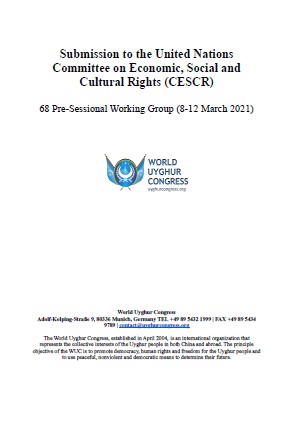WUC Submission to the United Nations Committee on Economic, Social and Cultural Rights (CESCR)

World Uyghur Congress, 08 March 2021
 The World Uyghur Congress submitted a report to the United Nations Special Rapporteur to the Committee on Economic, Social and Cultural Rights (CESCR) .The report provides information to the committee ahead of the pre-sessional working group on 8-12 March 2021, with the view that the Committee members take into consideration the information and ask pointed questions regarding the treatment of the Uyghur population in China.
The World Uyghur Congress submitted a report to the United Nations Special Rapporteur to the Committee on Economic, Social and Cultural Rights (CESCR) .The report provides information to the committee ahead of the pre-sessional working group on 8-12 March 2021, with the view that the Committee members take into consideration the information and ask pointed questions regarding the treatment of the Uyghur population in China.
Issues relating to the general provisions of the Covenant (arts. 1-5)
Article 1 – Right to Self-Determination
WUC notes that the People’s Republic of China (hereafter: China) has failed to ensure its people are ‘’fully enjoying the right of self determination’’. In fact, the Chinese government has effectively criminalised any action perceived to be promoting the right to self-determination, often inculpating Uyghurs of false charges of ‘’splittism’’, which is also frequently linked to ‘’terrorism’’ charges.
Article 2, paragraph 2 – Non-discrimination
Hower, the WUC observes that in the last four years, the Chinese government has intensified its repression against the Uyghur people in the Uyghur Region. In late 2016, the then newly appointed CCP Secretary for the Uyghur Region, Chen Quanguo, introduced a grid-style system of total surveillance, which was first tested on the Tibetan people, in both the public and the private sphere. He also oversaw the establishment of political indoctrination camps all over the region, numbering in the thousands.
Issues relating to the specific provisions of the Covenant (arts. 6-15)
Article 7 – The right to just and favourable conditions of work
The WUC notes that the Chinese government has failed to eliminate the forced labour system, particularly with its ‘’Xinjiang Aid’’ program. Evidence has shown that the breadth of the forced labour policy creates significant risk of the presence of forced labour at virtually any workplace, industrial or agricultural, in the Uyghur Region. Beyond the textile and apparel production, forced labour is also widespread in cotton picking.
Article 10 – Protection of the family, mothers and children
The WUC considers that with a policy of forced sterilisation and population control targeting Uyghur women in the Uyghur Region, the Chinese government has failed to prevent the use of coercive measures in the implementation of the birth control policy, and protect both women and children. This policy appears to aim to significantly diminish the Uyghur population and is taking place in the context of the mass arbitrary detention of Uyghur in internment camps, use of Uyghur detainees in forced labour programs, attempts to forcibly assimilate and indoctrination ethnic Uyghurs and a denial of the Uyghur people’s most basic rights and freedoms.
Article 12 – The Enjoyment of the Highest Attainable Standard of Physical and Mental Health
Several camp survivors have shared their personal experiences during their arbitrary detention in internment camps in the Uyghur Region. They have all described the poor conditions in which they were detained. Inmates were not allowed to use water often, unless it was for medication, otherwise they would be reprimanded for performing ablution. There was no air conditioning during the hot summer days. Inmates did not have any beds or mattresses to sleep on and were handcuffed when they were sleeping and eating.
Article 13 – The Right to Education
However, WUC observes that sites of cultural importance like the old town of Kashgar with narrow streets and ancient mudbrick houses, for example, were nearly completely destroyed between 2009 and 2011 to “facilitate maximum security and surveillance of the local population”.
The report can be read in full here.

